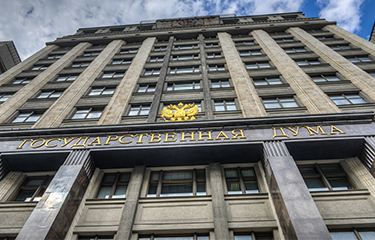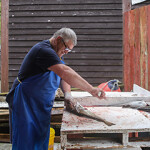Russian Parliament working to resolve fight over Barents Sea cod, haddock catch

Russia’s State Duma, the lower house of the Russian Parliament, recently approved a bill designed to resolve a dispute over cod and haddock catches in the country’s Northern Fishery Basin.
Russia's Northern Fishery Basin yields nearly 500,000 metric tons, or 10 percent, of Russia’s annual catch, primarily consisting of cod and haddock fished in the White and Barents seas. Two separate fishing types – coastal fishing and industrial fishing – are involved in the fishery, with differing regulations and taxation levels for each.
Coastal fishing in Russia is a legal framework under which quotas for species are regulated and allocated by regional authorities, with fishing companies obligated to land their catches in Russian ports. The framework allows for guaranteed supplies of catch to domestic processing facilities, which in turn helps maintain coastal communities and more flexible management of quotas and fisheries.
In 2020, the coastal fishing framework was placed in jeopardy by a letter sent by the Western Arctic Department of the Russian Frontier Service of the Federal Security Service (FSB) to the Union of Fisheries of the North (UFN) – an industry body representing local companies – in which it warned that fisheries were violating federal fishing laws and must cease all activity. The letter claimed federal law required all catches to be delivered to ports in live, fresh, or chilled formats – while the companies commonly gutted, beheaded, and bled their catch dry at sea.
In response, UFN said the two-day passage from the fishing grounds to ports meant their catch could not be delivered safely without processing. Moreover, the group said Russian food regulations require the processing of some species within a limited time after the catch – most no later than a few hours. UFN also claimed the federal law on fishing doesn’t contain any prohibition on processing.
Murmansk Regional Governor Andrei Chibis, top officials from the Russian Federal Agency for Fisheries, and members of both chambers of the Russian Parliament backed the UFN, but their effort proved fruitless, as FSB continued to push its effort to stop the coastal fishery from processing its catch. In autumn 2020, FSB conducted a search-and-seizure operation onboard costal fishing vessels in Murmansk, and subsequently filed complaints in court against fishing companies and captains found to have processed fish. According to the Russian legislature, the maximum fine for proved violations of Russia's fishing law is two to three times the cost of the catch and the confiscation of the ship involved.
Sergey Sennikov, the deputy CEO of the Norebo group of fishing companies, estimated coastal fishing companies caught nearly RUB 5 billion (USD 67.2 million, EUR 56.7 million) worth of cod and haddock in 2020, meaning they faced up to RUB 15 billion (USD 201.5 million, EUR 170 million) in fines, with their captains facing another RUB 7.5 billion (USD 100.7 million, EUR 85 million), according to business newspaper Kommersant.
Though no fines have yet been issued and no trials have taken place to-date, FSB's aggressiveness in pursuing their charges scared many companies into ceasing operation. As a result, in 2020, a total of 7,580 MT of fish quota was left in the water, including 5,320 MT of cod and 2,260 MT of haddock, according to UFN Board Chairman Vladimir Grigoryev. Grigoryev estimated the financial loss at nearly RUB 800 million (USD 10.7 million, EUR 9.1 million).
Coastal fishing had previously been encouraged by the Russian government under the federal investment quotas program launched a few years ago. That program gave companies that built new ships or processing plants in Russia additional quota for some species. Several plants built under that program are soon to be completed in the Murmansk region.
However, the investment quotas granted via the program will cover only part of the raw materials needed for the plants to profitably operate. The rest of the raw materials were supposed to be delivered through coastal fishing. In 2020, Irina Vansovich, the head of the Murmansk branch of the Fishery Union, said three plants had experienced fish supply shortages due to the conflict, she said in an interview with Kommersant.
Subsequently, coastal fishing companies have thus far shown much less interest in applying for the investment quota program in 2021. The application campaign, held in late 2020, revealed that seven of the 30 companies decided not to pursue cod and haddock within coastal fishing this year, and another three companies reduced the planned catch. For 2021, coastal fishing quotas totaled 28,000 MT for cod and 8,000 MT for haddock, but here is a risk that those quotas will not be fished if no changes are made to the currently regulatory situation, UFN General Director Konstantin Drevetnyak said. In January 2021, cod and haddock catches were down by 3,600 MT year-over-year, according to UFN’s data.
Dmitry Kostov, the CEO of coastal fishing firm Arctiflot, recently told MurmanTV that, in the last months of 2020, his company was not active in coastal fishing
"We didn’t understand how to do it [legally].”
This year, he said, the company has resumed operations, with the understanding that it faces a legal risk.
“We don’t know how all this will end up,” Kostoc said. “All companies working in coastal fishing now are doing this at own risk and peril.”
Coastal fishing companies have reached out for help from members of both chambers of Russia’s Parliament. In late 2020, a working group of representatives of State Duma and Federation Council introduced a bill to change federal fisheries law to allow those companies to resume their processing operations. As of February, the bill had passed the first reading. According to the bill, fishing companies will have the right to land their catch in a bloodless, gutted, and beheaded format at Russian ports through the middle of 2022. Fish heads, which previously had been thrown overboard, must be also delivered to the port, and then disposed of on land. After 1 July, 2022, removing fish heads while at sea will be forbidden.
“We hope that the fisheries operating in our northern seas will start again to fish without fear, [that] factories will get raw materials of high quality, and fish will return to retail,” UFN Director-General Konstantin Drevyatnik said on the passage of the bill. In an interview with MurmanTV, he said that the coastal fishing sector is satisfied with the text of the bill.
UFN Chairman Vladimir Grigoryev recently told MurmanTV the bill is on track to become law within the next few months, a prospect Murmank Governor Andrei Chibis said portended a better outlook for the coastal fishing sector.
“We were pursuing these amendments to the law to get our fisheries to restart coastal fishing and resolve this very acute issue,” Chibis said.
Photo courtesy of Felix Lipov/Shutterstock





Share